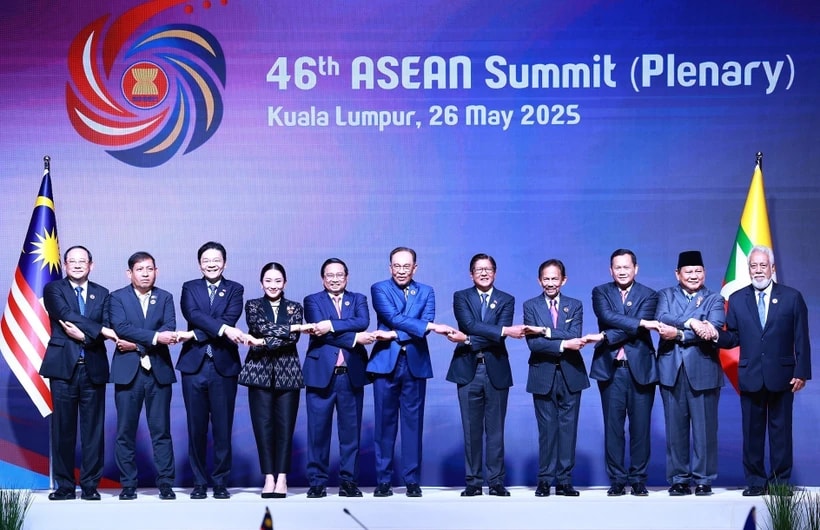ASEAN must maintain resilience, flexible adaption to changes: Vietnamese PM
In this challenging landscape, the leaders emphasised that ASEAN must reinforce solidarity, assert the value of dialogue, cooperation, and multilateralism, enhance strategic autonomy, and amplify its unified voice in contributing constructively to global processes.

Kuala Lumpur (VNA) – Vietnamese Prime Minister Pham Minh Chinh joined leaders of ASEAN member countries and Timor-Leste in a closed-door session to discuss international and regional issues on May 26 as part of the 46th ASEAN Summit and Related Summits in Kuala Lumpur, Malaysia.
At the meeting, ASEAN leaders acknowledged the region’s strategic importance as a crossroads of geopolitical and geo-economic interests, which is also facing the mounting pressures from strategic competition among major powers, protectionism, supply chain disruptions, and the widespread impacts of climate change, natural disasters, pandemics, and other non-traditional security threats. Meanwhile, the rise of emerging technologies is fundamentally reshaping development models.
In this challenging landscape, the leaders emphasised that ASEAN must reinforce solidarity, assert the value of dialogue, cooperation, and multilateralism, enhance strategic autonomy, and amplify its unified voice in contributing constructively to global processes.
On regional issues, the leaders reaffirmed ASEAN’s principled stance on the East Sea, stressing the importance of upholding international law, peacefully settling disputes, and ensuring the full and effective implementation of the Declaration on the Conduct of Parties in the East Sea (DOC), along with the need for early completion of a substantive and legally binding Code of Conduct in the East Sea (COC) in line with international law, including the 1982 United Nations Convention on the Law of the Sea (UNCLOS).
The leaders also acknowledged and hailed Malaysia’s ASEAN Chairmanship and the efforts of its Special Envoy on Myanmar, and voiced their support for ASEAN’s continued role in assisting Myanmar and the effective implementation of the Five-Point Consensus.
ASEAN reiterated its commitment to a rules-based, transparent and free multilateral trading system, as well as to enhancing intra-regional trade and investment and expanding economic linkages with external partners.
Addressing the meeting, PM Chinh echoed the leaders’ assessments, noting the world is undergoing a rapid and complex transformation marked by political polarisation, economic decoupling, institutional fragmentation, and developmental inequality.
In this context, the Vietnamese leader stressed that ASEAN must remain resilient, composed and clear-sighted, adapting flexibly and effectively to every change in the global landscape.
He underscored that ASEAN must steadfastly pursue a path of dialogue instead of confrontation, cooperation instead of competition, unity instead of division, and self-reliance instead of dependence. More than ever, ASEAN must strengthen internal solidarity, uphold its central role, and maintain balanced relations with major powers by making full use of the bloc’s existing cooperation mechanisms, the PM emphasised.
Sharing concerns over the potential impacts of the United States’ tariff policy adjustments on countries, including ASEAN members, PM Chinh emphasised that these challenges also present opportunities for ASEAN to enhance self-reliance and self-strengthening, and restructure its trade relations.
He urged the bloc to prioritise strengthening its internal capacity and expanding cooperation space by increasing intra-bloc trade and investment, capitalising on new growth drivers such as digital transformation and green economy, stimulating regional consumption, and improving energy and transport connectivity to facilitate the flow of goods.
The PM commended ASEAN’s timely response and coordinated stances under Malaysia’s Chairmanship, underscoring the need for the bloc to remain calm, reinforce coordination, share information and experiences, and persist in dialogue to find effective solutions.
PM Chinh expressed strong support for the early conclusion of the ASEAN Digital Economy Framework Agreement and the upgrade of the ASEAN Trade in Goods Agreement. He also called for the more effective utilisation of ASEAN’s economic partnership network, including the Regional Comprehensive Economic Partnership (RCEP), and urged progress in finalising free trade agreements with partners such as Canada. Furthermore, he encouraged upgrading existing FTAs with China and India to help diversify markets, products, and supply chains.
The Vietnamese leader voiced his deep concern over recent complicated developments in the East Sea, reiterating that ASEAN must make greater efforts to affirm its central role in addressing the issue, which is closely linked to regional peace, security, and stability. He called on the bloc to maintain unity and uphold its principled position on the East Sea issue.
Regarding the situation in Myanmar, PM Chinh welcomed the proactive and timely efforts of the ASEAN Chair, particularly initiatives aimed at mediating among relevant parties and promoting progress in implementing the Five-point Consensus. He stressed the importance of prioritising humanitarian assistance to support the people of Myanmar in recovering and rebuilding after the earthquake on March 28. He urged all parties in Myanmar to end violence, ensure the safe and smooth delivery of aid, exercise restraint, engage in dialogue, and place the interests of the people and the nation above all else.
On this occasion, PM Chinh highlighted that Vietnam had sent 60 tonnes of relief aid and more than 100 officers and soldiers to support rescue operations in Myanmar. He also noted that Vietnam had appointed a representative to join the informal advisory group of the ASEAN Chair and would continue working closely with Malaysia and other ASEAN members to foster dialogue and reconciliation, with the aim of achieving a viable and sustainable solution to the crisis. He called on ASEAN to intensify collective efforts to seek stronger, more effective solutions to the Myanmar issue./.


